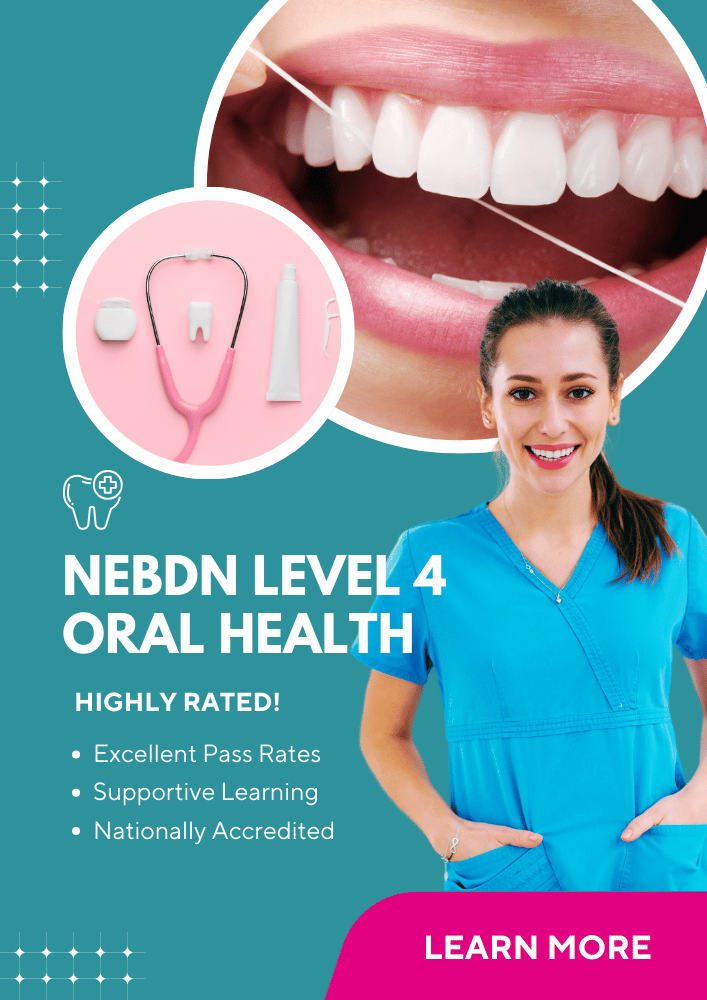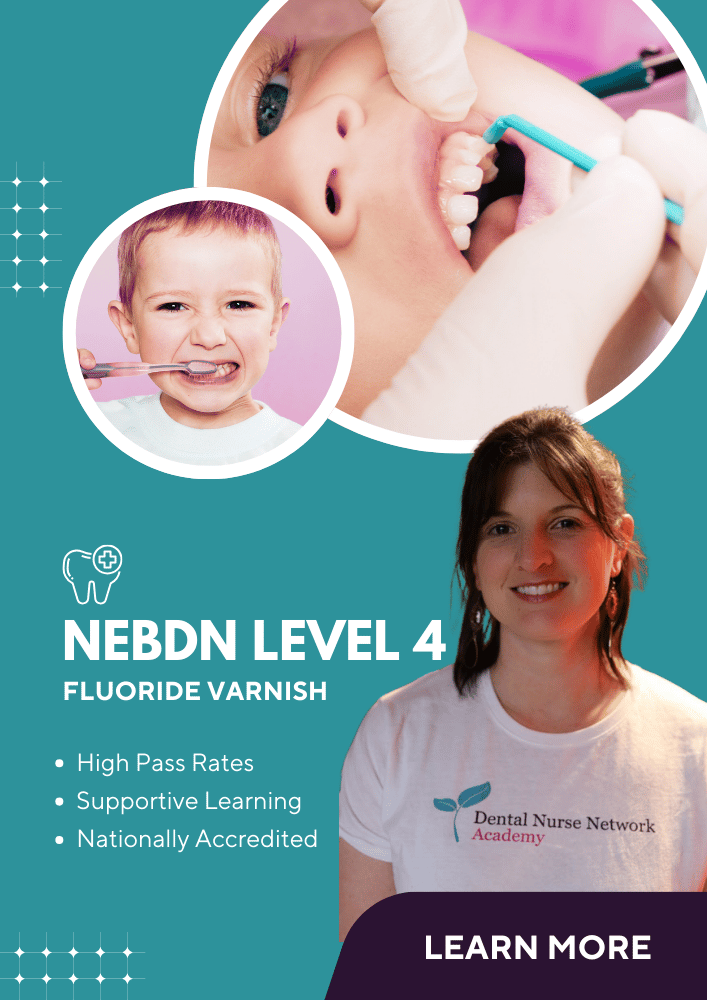 Career paths are very rarely linear anymore. While the generations before us would stick to one track — even if they didn’t enjoy it — today’s employees are waking up to the idea that work can be rewarding and support your lifestyle. It might even be fun, too!
Career paths are very rarely linear anymore. While the generations before us would stick to one track — even if they didn’t enjoy it — today’s employees are waking up to the idea that work can be rewarding and support your lifestyle. It might even be fun, too!
A dental nursing career may not seem like the next logical step for your professional trajectory. But if you’re here reading this article, then the thought has at least crossed your mind ...
What can you expect from a dental nursing career?
Dental nursing offers many rewards and opportunities.
As a dental nurse, you’d be part of a system that improves patients’ health, appearance, and overall self-esteem — and what could be more rewarding than that? When asked, almost half of people say they’re unhappy with their teeth (some even avoid smiling for fear of judgement from others), and you could help restore their confidence.
You’d also get to meet and interact with patients of all ages, cultures, and personalities. If you’re a “people person” who enjoys being around others and making a difference to their health, then a career in dental nursing might be just the perfect fit!
But it’s not just about the softer side of the job. Dental nurses have a long list of key responsibilities and essential tasks — each of which are crucial to the smooth running of a dental practice each day.
Dental nurses are responsible for:
- Welcoming patients, looking after patient records, and making notes during the dental examinations.
- Working closely with the dentist, responding quickly to requests.
- Ensuring that all relevant supplies and materials are in their place.
- Maintaining and cleaning the instruments and dental operating equipment.
- Contacting hospitals or orthodontic clinics when necessary on behalf of a patient.
- Keeping the surgery a clean and calming environment — ready for anything!
Scope of Practice for Dental Nurses
The General Dental Council (GDC) states:
Dental nurses are registered dental professionals who provide clinical and other support to registrants and patients.
As a dental nurse, you can undertake the following if you are trained, competent and indemnified:
- Prepare and maintain the clinical environment, including the equipment.
- Carry out infection prevention and control procedures to prevent physical, chemical and microbiological contamination in the surgery or laboratory.
- Record dental charting and oral tissue assessment carried out by other registrants.
- Prepare, mix and handle dental bio-materials.
- Provide chairside support to the operator during treatment.
- Keep full, accurate and contemporaneous patient records.
- Prepare equipment, materials and patients for dental radiography.
- Process dental radiographs.
- Monitor, support and reassure patients.
- Give appropriate patient advice.
- Support patients and colleagues if there is a medical emergency.
- Make appropriate referrals to other health professionals.
Additional skills dental nurses could develop include:
- Further skills in oral health education and oral health promotion.
- Assisting in the treatment of patients who are under conscious sedation.
- Further skills in assisting in the treatment of patients with special needs.
- Further skills in assisting in the treatment of orthodontic patients.
- Intra- and extra-oral photography.
- Pouring, casting and trimming study models.
- Shade-taking.
- Tracing cephalographs.
Additional skills carried out on prescription from, or under the direction of, another registrant:
- Taking radiographs.
- Placing rubber dams.
- Measuring and recording plaque indices.
- Removing sutures after a wound has been checked by a dentist.
- Constructing occlusal registration rims and special trays.
- Repairing the acrylic component of removable appliances.
- Applying topical anaesthetic to the prescription of a dentist.
- Constructing mouthguards and bleaching trays to the prescription of a dentist.
- Constructing vacuum-formed retainers to the prescription of a dentist.
- Taking impressions to the prescription of a dentist or a CDT (where appropriate).
Dental nurses can apply fluoride varnish either on prescription from a dentist or directly as part of a structured dental health programme.
Scope of Practice, GDC 2013
Lastly, let’s debunk one major stereotype about the dental nursing career. No, you don’t have to be a woman to be a dental nurse.
True, dental nursing has been a predominantly female field for quite some years (leading to the generalisation that women make better dental nurses). But there are more and more men making a name for themselves in the sector too.
Interested in hearing more about the dental nursing experience from a male perspective? Have a read of this interview.
What soft and hard skills do I need as a dental nurse?
We can sum up a dental nurse’s responsibilities in three words: administration, counselling, and craftsmanship. See, we told you it was varied! So what are the core skills you’ll need to succeed?
Empathy
This is an essential skill for anyone stepping into a healthcare role. Empathy is all about being able to see a patient’s point of view and understand their lived experience.
Remember how we said that thousands of people are unhappy with their smile? You may well see patients who are embarrassed about their oral health or resistant to treatment — it’s your responsibility to keep them calm and reassure them that what may feel uncomfortable now will ultimately be beneficial to them.
You may also encounter patients who are terrified of visiting the dentist. Your welcoming smile (or eyes, considering you’ll likely be wearing a mask!) will be required to ease their nerves and keep them sitting still.
Attention to detail
Being detail-oriented pays off in many ways as a dental nurse — when sterilising instruments or even when managing the diary. The clinician(s) will look to you as a right-hand person; they’ll need to trust that you’re paying attention to the minutiae, as that empowers them to do their job well.
Strong team player
Every single person in the dental team contributes to a practice’s success. As a dental nurse, your job description may be to support the dentist, but you’ll need to be accountable for getting your own work done — and doing it to a very high standard.
As you progress through your career, you may even become a mentor or inspiration for other dental nurses in your practice or local area. And, as we mentioned before, you’ll also be the person that patients look to for oral healthcare advice and insights. Individuals who are naturally considerate of other people and their needs have the potential to become truly irreplaceable dental nurses indeed.
Commitment to patient care and personal development
Passion and commitment take you a long way in any career, but this is especially true in dental nursing. When it’s your job to disinfect and prepare the equipment thoroughly, take down accurate assessment notes, and perform many more tasks that are critical to a patient’s oral health, then you’d better be engaged with your work!
People are trusting you with their healthcare — and that’s a very special honour indeed!
But aside from wanting to do your best for patients, you should also want to do your best for yourself.
The responsibilities that may make you feel nervous as a trainee nurse, and in need of encouragement, will soon become second nature. And from there, you’ll want to build on the foundations you’ve established — taking ownership of your personal development in a variety of ways.
So let’s discuss that now ...
A dental nurse’s typical career progression — and how to get started
Dental nursing can be a long, varied, and rewarding career. To begin, you’ll need to:
- Apply for a trainee position at a dental practice near you
- There are several routes into your trainee dental nurse position. You can:
- Search online for local clinics recruiting trainee roles.
- Contact dental recruitment agencies.
- Ask at the clinic you’re registered at — or ask if they know any fellow practices hiring trainees.
- Get in touch with any other dental nurses you may know or reach out via a community forum.
- Undergo your accredited national diploma
Once you’ve been accepted at a practice, you are legally required to apply for an accredited national diploma in dental nursing — and you’ll need to do so within two years. The course can be undertaken as a qualification or an apprenticeship, and you can read more about accredited course providers right here.
To be accepted onto a diploma course, you’ll need to complete a DBS check — your practice should help you with this. You’ll also need to pay the course fees, which can usually be spread out over a payment plan.
Embrace personal development and upskill
As a qualified dental nurse, you’ll have plenty of opportunities to learn and develop. A Personal Development Plan will help you ascertain which skills and competencies you’d like to train in and why.
The more value you deliver within your clinic, the faster you’ll see yourself progress. You could train within a specialist area, such as radiography or orthodontics. Another option is to become a qualified oral health educator or practice manager or practice owner. Many nurses have gone on to become tutors and assessors, and some have studied to become hygienists or dentists. Visit our inspirations stories here to learn how other nurses progressed their careers.
Further qualifications and courses will likely be required as your career takes shape. But there really is no limit as to how far you can develop yourself if you are passionate, committed, and willing to put in the work and time required to retrain and redevelop.



